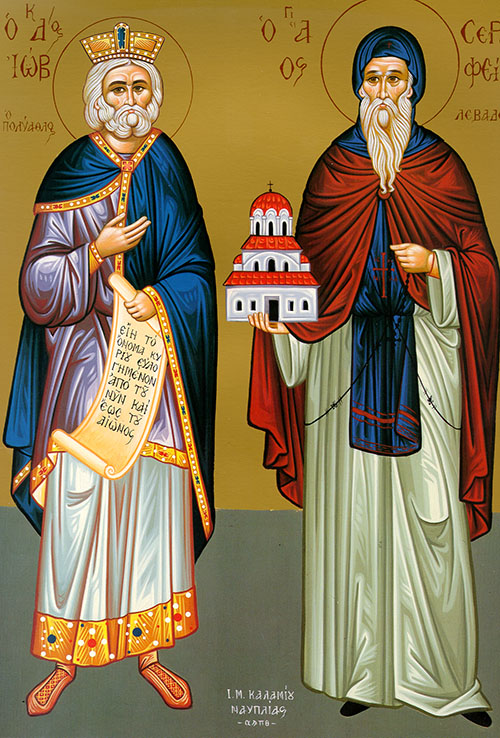

The righteous Job (whose name means “persecuted”), God’s faithful servant, was the perfect image of every virtue. The son of Zarah and Bossorha (Job 42), Job was a fifth-generation descendant of Abraham. He was a truthful, righteous, patient, and pious man who abstained from every evil thing. Job was very rich and blessed by God in all things, as was no other son of Ausis (his country, which lay between Idoumea and Arabia). However, divine condescension permitted him to be tested. Job lost his children, his wealth, his glory, and every consolation all at once. His entire body became a terrible wound covered with boils. Yet he remained steadfast and patient in the face of misfortune for seven years, always giving thanks to God. Later, God restored his former prosperity, and he had twice as much as before. Job lived for 170 years after his misfortune, completing his earthly life in 1350 BC at the age of 240.
Troparion
When the enemy of the just beheld the treasures of Job’s virtues, he sought to destroy them. He attacked his body but could not touch his spirit, for his pure soul was well armed. As for us, the same enemy stripped us and chained us. Therefore, O Savior, be on our side, protect us against the devil and save us.
Kontakion
O faithful Job, celebrated servant of God, you were a deeply just man and God’s sincere worshiper. You gave the world a stirring lesson by your patience and long-suffering. Therefore, we sing a hymn of praise to your memory and we honor you.
Epistle
Acts 17: 1-9
In those days, Paul and Silas took the road through Amphipolis and Apollonia and came to Thessalonica, where there was a Jewish synagogue. Following his usual custom, Paul joined the people there and conducted discussions with them about Scripture for three sabbaths. He explained many things, showing that the Messiah had to suffer and rise from the dead: “This Jesus I am telling you about is the Messiah!” Some of the Jews were convinced and threw their lot in with Paul and Silas. So, too, did a great number of Greeks sympathetic to Judaism, and numerous prominent women.
This only aroused the resentment of the Jews, however, who engaged loafers from the public square to form a mob and start a riot in the town. They marched on the house of Jason in an attempt to bring Paul and Silas before the people’s assembly. When they could not find them there, they dragged Jason himself and some of the brothers to the town magistrates, shouting: “These men have been creating a disturbance all over the place. Now they come here and Jason has taken them in. To a man, they disregard the Emperor’s decrees and claim instead that a certain Jesus is king.” In this way they stirred up the crowd. When the town’s magistrates heard the whole story, they released Jason and the others on bail.
Gospel
John 11: 47-54
At that time, the chief priests and the Pharisees called a meeting of the Sanhedrin against Jesus. They said, “What are we to do with this man performing all sorts of signs? If we let him go on like this, the whole world will believe in him. Then the Romans will come in and sweep away our sanctuary and our nation.” One of their number named Caiaphas, who was a high priest that year, addressed them at this point: “You have no understanding whatever! Can you not see that it is better for you to have one man die for the people than to have the whole nation destroyed?” He did not say this on his own. It was rather as high priest for that year that he prophesied that Jesus would die for the nation – and not this nation only, but to gather into one all the dispersed children of God.
From that day onward there was a plan afoot to kill Jesus. In consequence, Jesus no longer moved about freely in Jewish circles. He withdrew instead to a town called Ephriam in the region near the desert, where he stayed with his disciples.
Icon courtesy of Jack Figel, Eastern Christian Publications – ecpubs.com
Monday, May 6 –